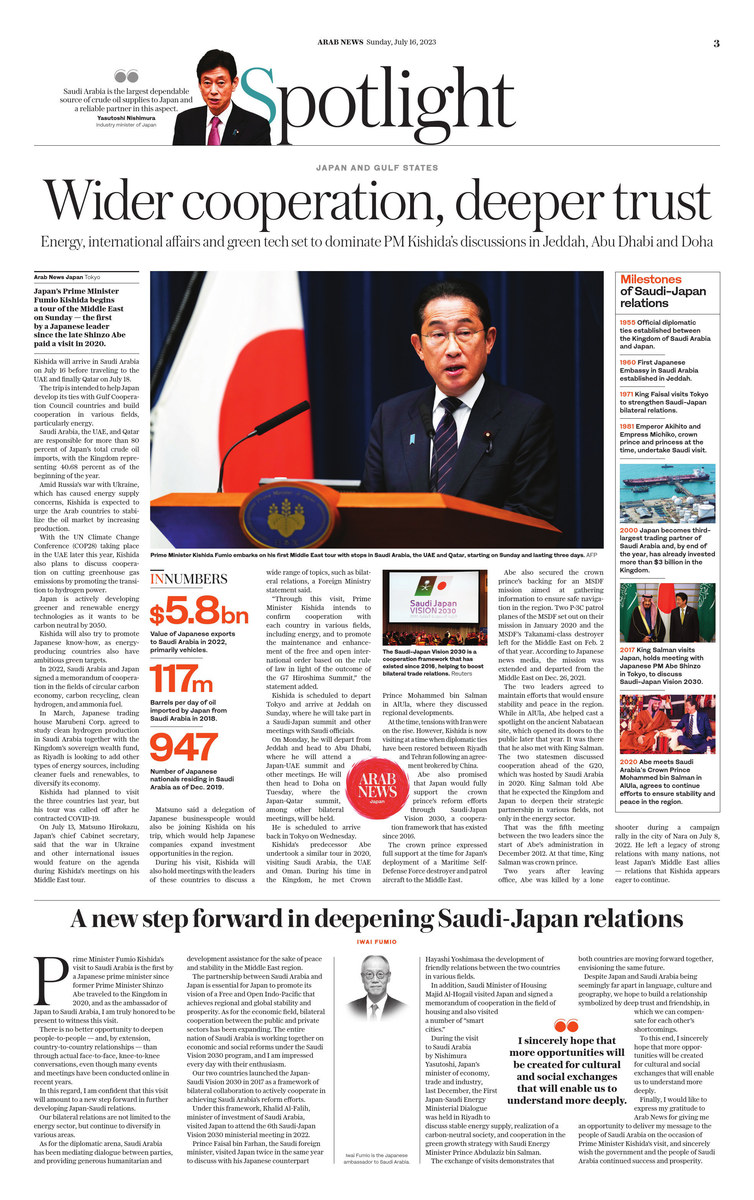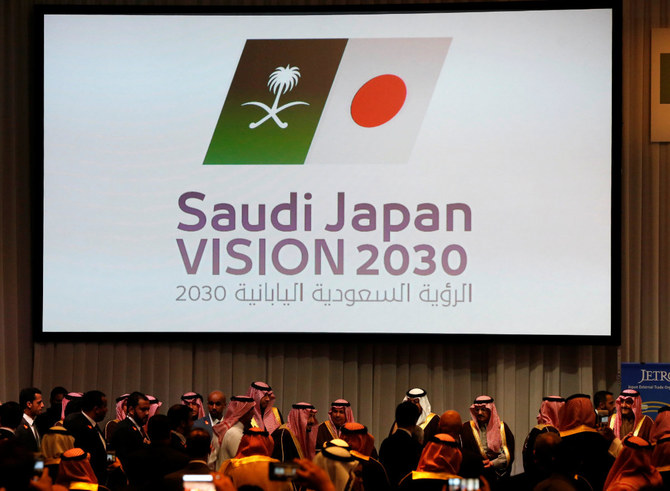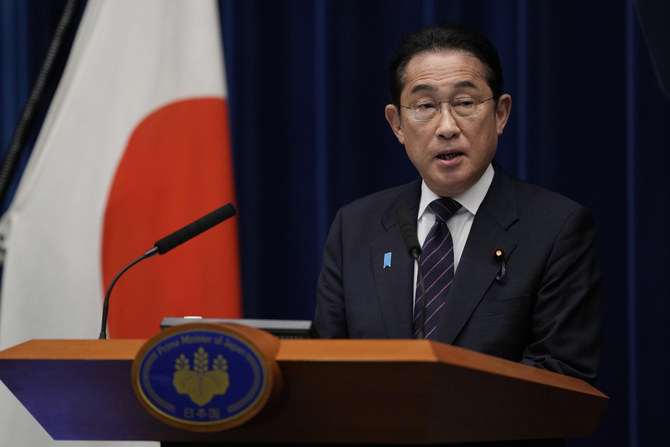TOKYO: Japan’s Prime Minister Fumio Kishida begins a tour of the Middle East on Sunday — the first by a Japanese leader since the late Shinzo Abe paid a visit in 2020.
Kishida will arrive in Saudi Arabia on July 16 before traveling to the UAE and finally Qatar on July 18.
The trip is intended to help Japan develop its ties with Gulf Cooperation Council countries and build cooperation in various fields, particularly energy.
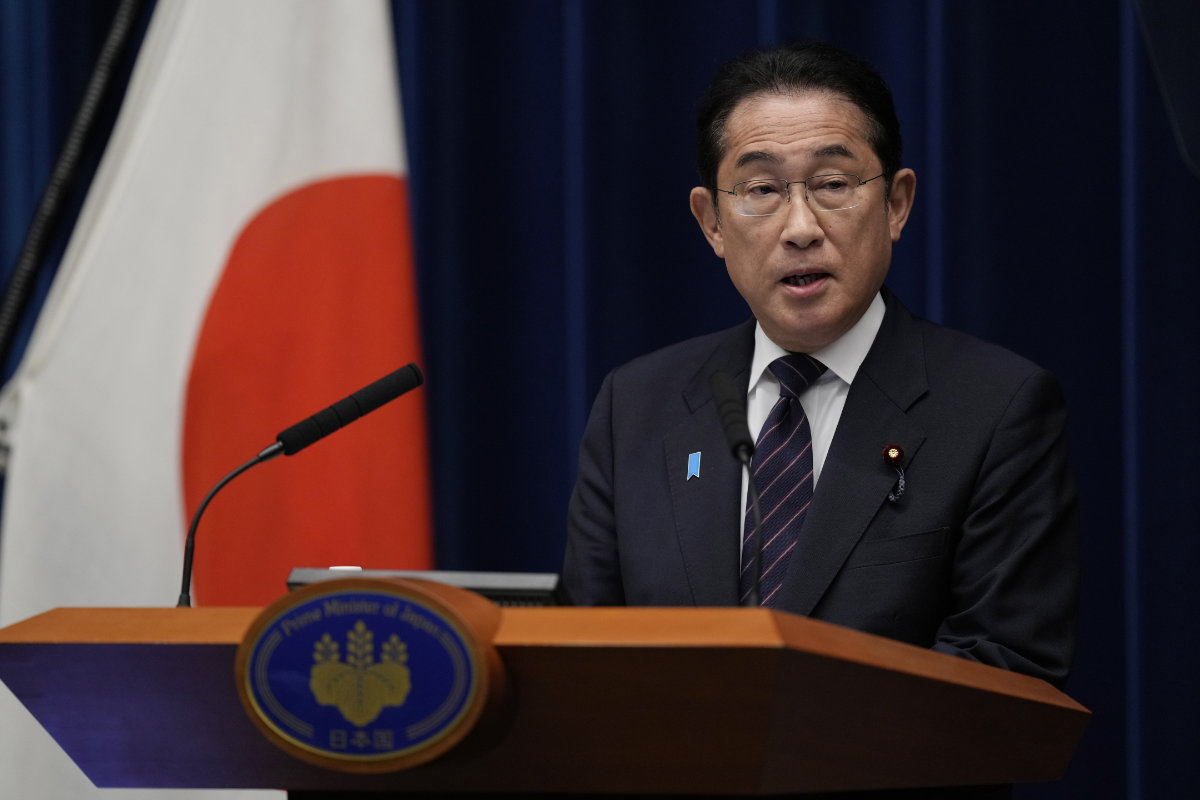
Japan Prime Minister Kishida Fumio embarks on his first middle East tour with stops in Saudi Arabia, the UAE and Qatar, starting on Sunday and lasting three days. (AFP)
Saudi Arabia, the UAE, and Qatar are responsible for more than 80 percent of Japan’s total crude oil imports, with the Kingdom representing 40.68 percent as of the beginning of the year.
Amid Russia’s war with Ukraine, which has caused energy supply concerns, Kishida is expected to urge the Arab countries to stabilize the oil market by increasing production.
With the UN Climate Change Conference (COP28) taking place in the UAE later this year, Kishida also plans to discuss cooperation on cutting greenhouse gas emissions by promoting the transition to hydrogen power.

Japan is actively developing greener and renewable energy technologies as it wants to be carbon neutral by 2050.
Kishida will also try to promote Japanese know-how, as energy-producing countries also have ambitious green targets.
In 2022, Saudi Arabia and Japan signed a memorandum of cooperation in the fields of circular carbon economy, carbon recycling, clean hydrogen, and ammonia fuel.
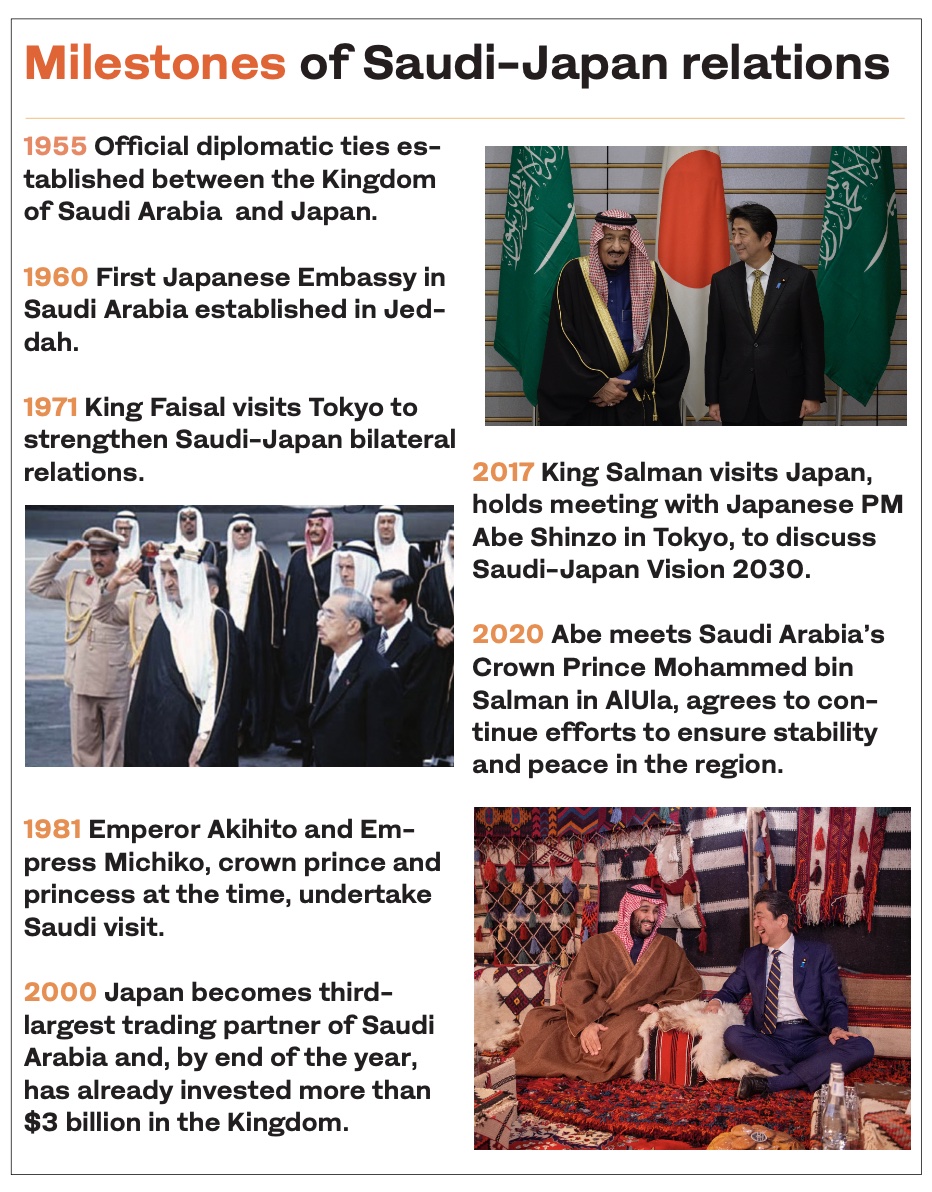
In March, Japanese trading house Marubeni Corp. agreed to study clean hydrogen production in Saudi Arabia together with the Kingdom’s sovereign wealth fund, as Riyadh is looking to add other types of energy sources, including cleaner fuels and renewables, to diversify its economy.
Kishida had planned to visit the three countries last year, but his tour was called off after he contracted COVID-19.
On July 13, Matsuno Hirokazu, Japan’s chief cabinet secretary, said that the war in Ukraine and other international issues would feature on the agenda during Kishida’s meetings on his Middle East tour.
Opinion
This section contains relevant reference points, placed in (Opinion field)
Matsuno said a delegation of Japanese businesspeople would also be joining Kishida on his trip, which would help Japanese companies expand investment opportunities in the region.
During his visit, the prime minister will also hold meetings with the leaders of these countries to discuss a wide range of topics, such as bilateral relations, a foreign ministry statement said.
“Through this visit, Prime Minister Kishida intends to confirm cooperation with each country in various fields, including energy, and to promote the maintenance and enhancement of the free and open international order based on the rule of law in light of the outcome of the G7 Hiroshima Summit,” the statement added.
Kishida is scheduled to depart Tokyo and arrive at Jeddah on Sunday, where he will take part in a Saudi-Japan summit and other meetings with Saudi officials.
READ MORE: Kishida’s Arab Tour
On Monday, he will depart from Jeddah and head to Abu Dhabi, where he will attend a Japan-UAE summit and other meetings. He will then head to Doha on Tuesday, where the Japan-Qatar summit, among other bilateral meetings, will be held.
He is scheduled to arrive back in Tokyo on Wednesday.
Kishida’s predecessor Abe undertook a similar tour in 2020, visiting Saudi Arabia, the UAE and Oman. During his time in the Kingdom, he met Crown Prince Mohammed bin Salman in AlUla, where they discussed regional developments.
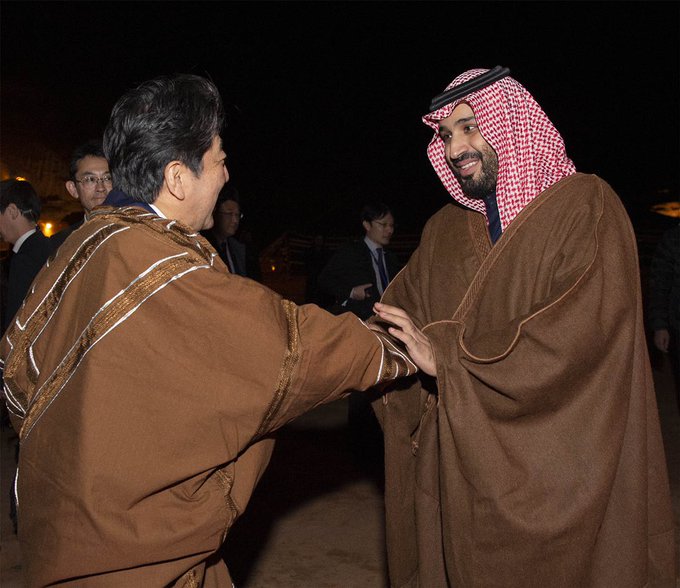
Saudi Arabia's Crown Prince Mohammed bin Salman receiving then Japanese PM Shinzo Abe in AlUla on January 12, 2020. (SPA)
At the time, tensions with Iran were on the rise. However, Kishida is now visiting at a time when diplomatic ties have been restored between Riyadh and Tehran following an agreement brokered by China.
Abe also promised that Japan would fully support the crown prince’s reform efforts through Saudi-Japan Vision 2030, a cooperation framework that has existed since 2016.
The crown prince expressed full support at the time for Japan’s deployment of a Maritime Self-Defense Force destroyer and patrol aircraft to the Middle East.
Abe also secured the crown prince’s backing for an MSDF mission aimed at gathering information to ensure safe navigation in the region.
INNUMBERS
$5.08 billion Value of Japanese exports to Saudi Arabia in 2022, primarily vehicles.
1.17 million Barrels per day of oil imported by Japan from Saudi Arabia in 2018.
947 Number of Japanese nationals residing in Saudi Arabia as of Dec. 2019.
Two P-3C patrol planes of the MSDF set out on their mission in January 2020 and the MSDF’s Takanami-class destroyer left for the Middle East on Feb. 2 of that year.
According to Japanese news media, the mission was extended and departed from the Middle East on Dec. 26, 2021. The two leaders agreed to maintain efforts that would ensure stability and peace in the region.
While in AlUla, Abe helped cast a spotlight on the ancient Nabataean site, which opened its doors to the public later that year. It was there that he also met with King Salman. The two statesmen discussed cooperation ahead of the G20, which was hosted by Saudi Arabia in 2020.
King Salman told Abe that he expected the Kingdom and Japan to deepen their strategic partnership in various fields, not only in the energy sector.
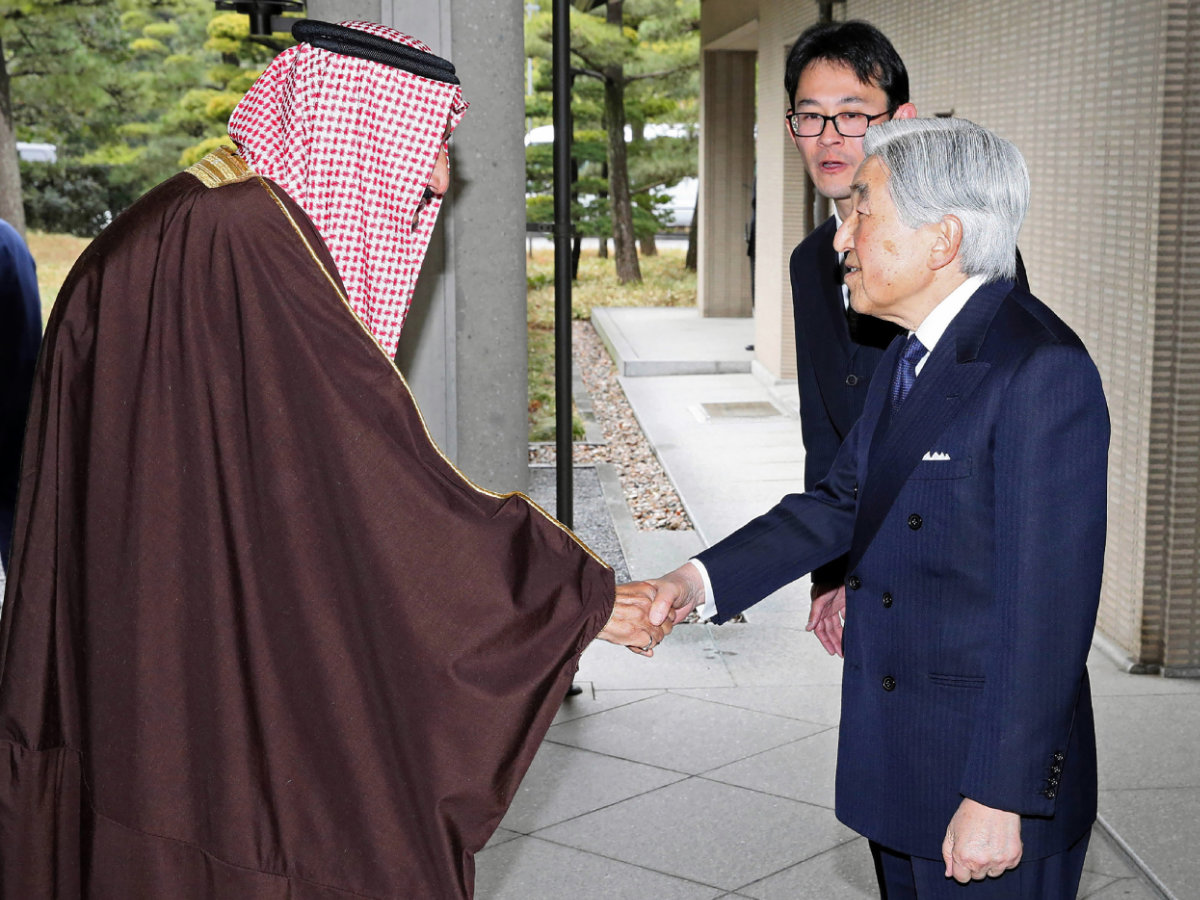
Saudi Arabia's King Salman bin Abdulaziz al-Saud (L) is welcomed by Japanese Emperor Akihito (R) prior to their luncheon at the Imperial Palace in Tokyo on March 14, 2017. (AFP)
That was the fifth meeting between the two leaders since the start of Abe’s administration in December 2012. At that time, King Salman was crown prince.
Two years after leaving office, Abe was killed by a lone shooter during a campaign rally in the city of Nara on July 8, 2022. He left a legacy of strong relations with many nations, not least Japan’s Middle East allies — relations that Kishida appears eager to continue.
Before his Middle East tour, Kishida embarked on a trip to Lithuania and attended a NATO summit on July 12. He asked for NATO’s increased commitment to the Indo-Pacific region to counter China’s military activities.
He also held talks with Jens Stoltenberg, the NATO secretary-general, and discussed a new Japan-NATO document on space cooperation.
Stoltenberg said member countries failed to agree on a plan to establish a liaison office in Tokyo.
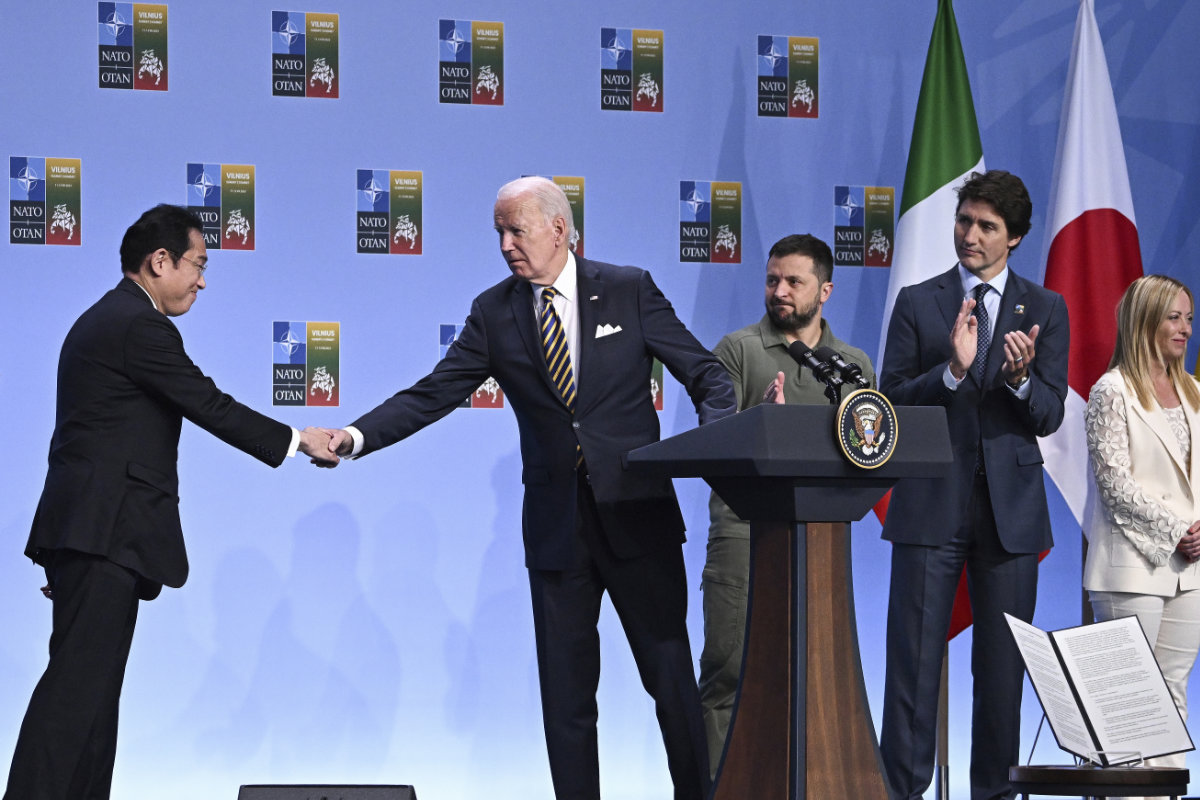
Japan's Prime Minister Fumio Kishida, left, joins US President Joe Biden, Ukrainian President Volodymyr Zelensky and G7 leaders including Canada's Prime Minister Justin Trudeau and Italy's Prime Minister Giorgia Meloni at an event to announce a Joint Declaration of Support for Ukraine during the NATO Summit in Vilnius, Lithuania, on July 12, 2023. (Pool Photo via AP)
“The issue of a liaison office is still on the table. It will be considered in the future,” Stoltenberg said after the two-day summit in Vilnius.
France has opposed the Tokyo office plan out of concern over a potential backlash from China. French President Emmanuel Macron has said the Indo-Pacific was not the North Atlantic.
Kishida also met South Korean President Yoon Suk Yeol on the sidelines of the NATO summit and outlined Japan’s plans to release treated water from the stricken Fukushima nuclear power plant into the ocean.
In Lithuania, Kishida held talks with Ukrainian President Volodymyr Zelensky to pledge Tokyo’s continued support for Kyiv in the war with Russia.
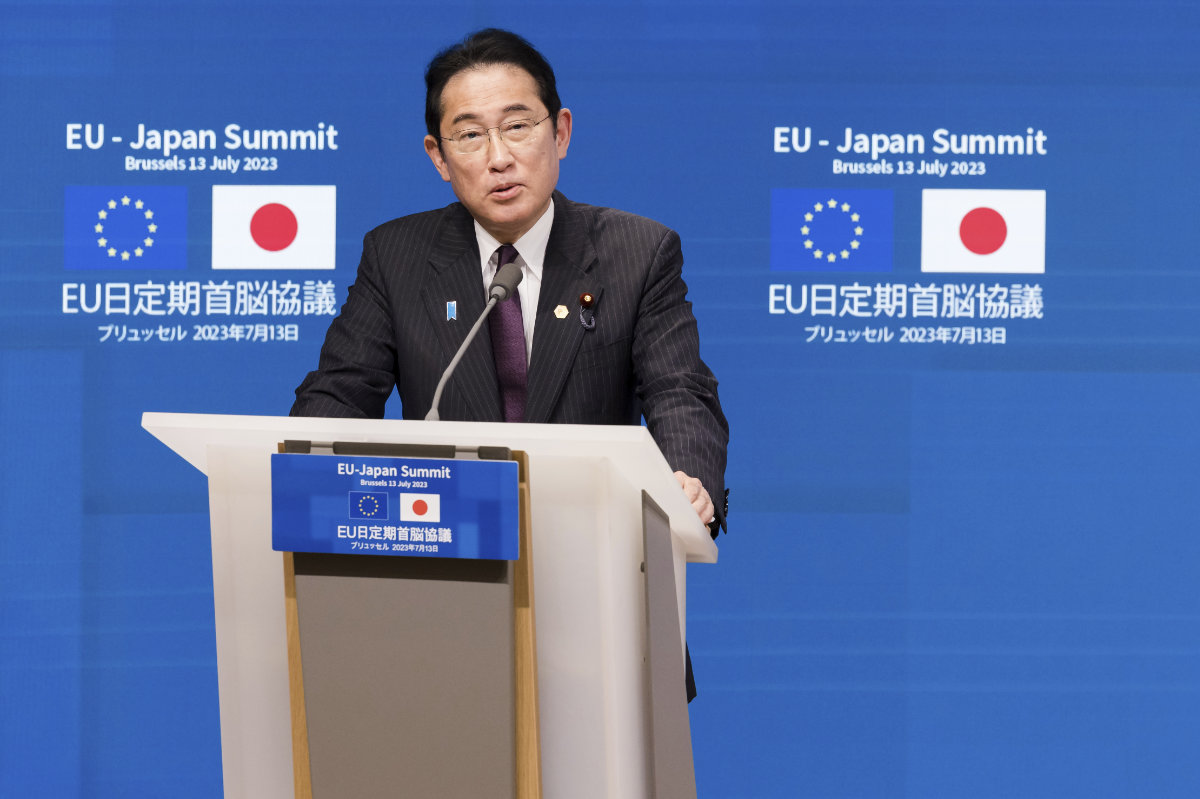
Japan's Prime Minister Fumio Kishida addresses the media after an EU-Japan summit in Brussels, Belgium on July 13, 2023. (AP Photo)
In Belgium, on July 13, Kishida met European Council President Charles Michel and European Commission President Ursula von der Leyen to discuss security and economic cooperation.
European leaders will be watching Kishida’s Middle East tour with interest as they, too, consider their own energy security prospects and options for green transition.
